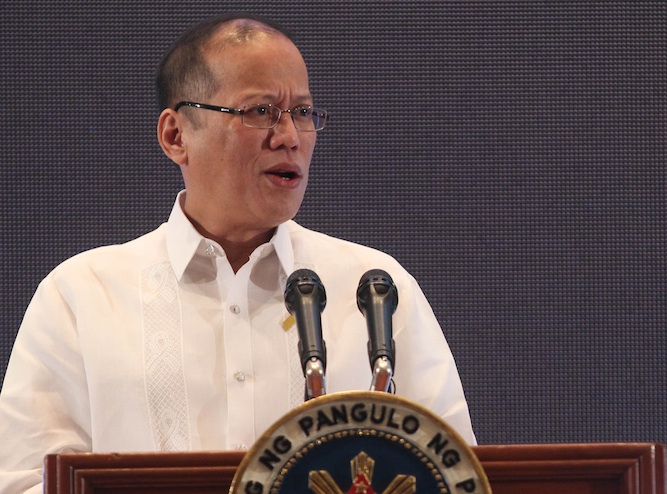SUMMARY
This is AI generated summarization, which may have errors. For context, always refer to the full article.

DAVAO CITY, Philippines – Changes in the country are now “tangible,” President Benigno Aquino III said Tuesday, February 5.
“Today, change is tangible—from the thousands of new classrooms, to the new businesses setting up shop, to the tourists who continue to flock our shores. But this is only the tip of the iceberg: a sea change is also taking place in our mindsets,” Aquino said in a speech during the closing ceremony of the 2013 Philippines Development Forum in Davao City.
Aquino said the country has witnessed 6.6% full year growth for 2012.
The Department of Public Works and Highways (DPWH) has also attained historic gains with more than P12 billion savings. The Bureau of Internal Revenue (BIR) has also collected at least P1 trillion, Aquino said.
He added that the Pantawid Pamilyang Pilipino Program’s (PPP) budget for 2013 has also increased four times from 2010. The budget increased from P10 billion to P44.3 billion and is designed to serve more than 3.8 million families.
The expansion of the PhilHealth program and the implementation of the K to 12 program are also achievements that must be recognized, Aquino said.
Aquino explained that these gains are products of the government’s commitment to good governance and to the private investors who continue to support the country.
“Restoring faith in systems eroded by corruption also means holding each public servant and institution up to the standard of integrity,” Aquino commented.
“This kind of transparency and accountability leads to the increased efficiency of agencies and redounds to real results: money saved, programs improved, and people helped,” he added.
Challenge
“The challenge will always be how to ensure that our gains are inclusive, or more inclusive,” Aquino said.
Aquino said the country is at a critical juncture in ensuring a better future for the country.
“As we near the midpoint of our term, it is all the more important for us to look back on both our successes and shortcomings, so we can strategize for the future,” Aquino said.
Aquino said his administration is maximizing the remaining three years of his term “to build on what we have achieved, improve where we are lacking, and fulfill our promises to our people—towards attaining inclusive growth, sustainable progress, and greater peace and stability”.
But Aquino expressed confidence that the development programs of the country would be achieved with the help of the private investors and international donors who have committed support to the country.
“Among the biggest contributors to this growth were trade, renting and business activities, real estate, construction activities, and on the demand side, household consumption, and net exports. These indicate increased private sector activity and capacity, signs that growth has become more sustainable,” Aquino said.
Mindanao
Aquino said one of the central focuses in the development agenda of the country is Mindanao in light of the breakthroughs in the peace talks with the Moro Islamic Liberation Front (MILF).
“We Filipinos have always known it to be the Land of Promise, because of its great potential for growth and development. Unfortunately, for the longest time, this potential remained untapped, and its promise, unfulfilled; instead, some parts of Mindanao were known by many for violence, inequality, and corruption in local governance,” Aquino said.
Several reforms in Mindanao mentioned by Aquino include the synchronization of the elections in ARMM.
This electoral reform Aquino said is a “move that will allow our countrymen here to exercise their rights and cast their votes for the candidates they truly believe in”.
“There is also the ARMM transitional investment support plan, which allots 8.59 billion pesos for development projects, from the construction of necessary infrastructure in transportation and health, to improving the quality of education available, to even strengthening the Halal food industry,” Aquino said.
Aquino added that it is necessary to step up reform to foster inclusive growth in Mindanao. – Rappler.com
Related stories:
Add a comment
How does this make you feel?
There are no comments yet. Add your comment to start the conversation.